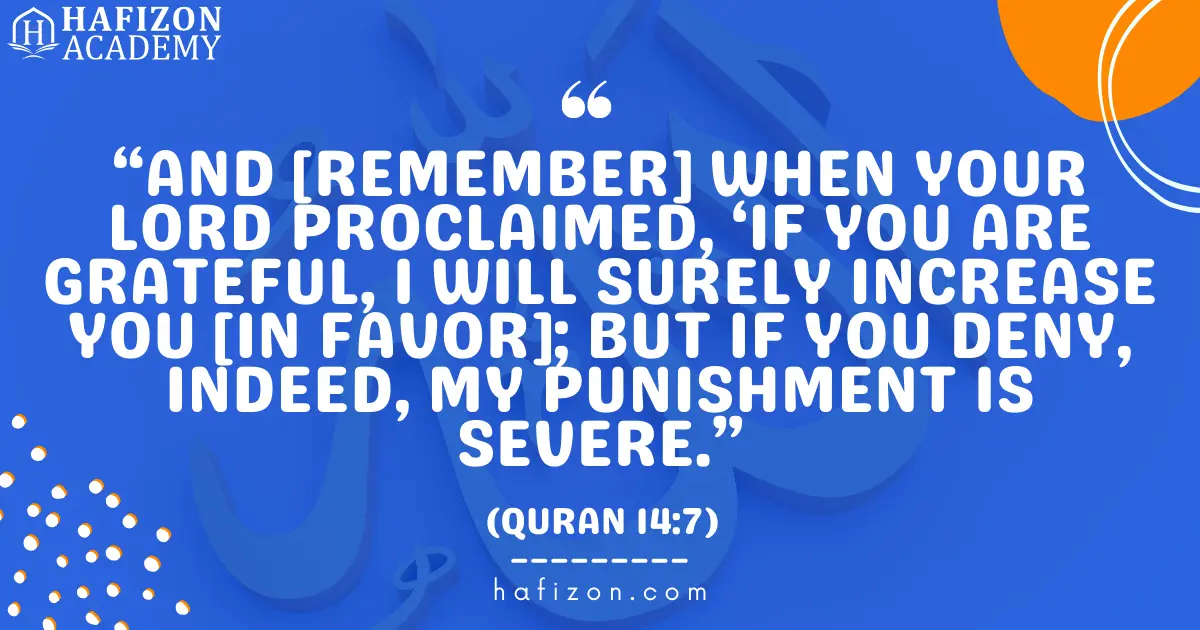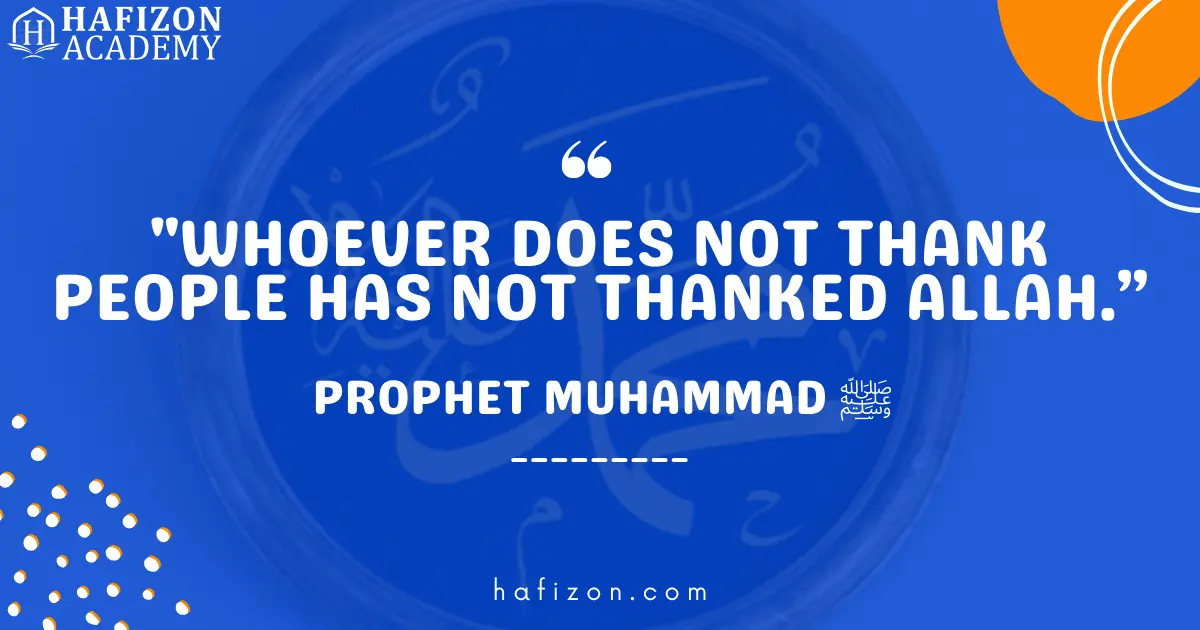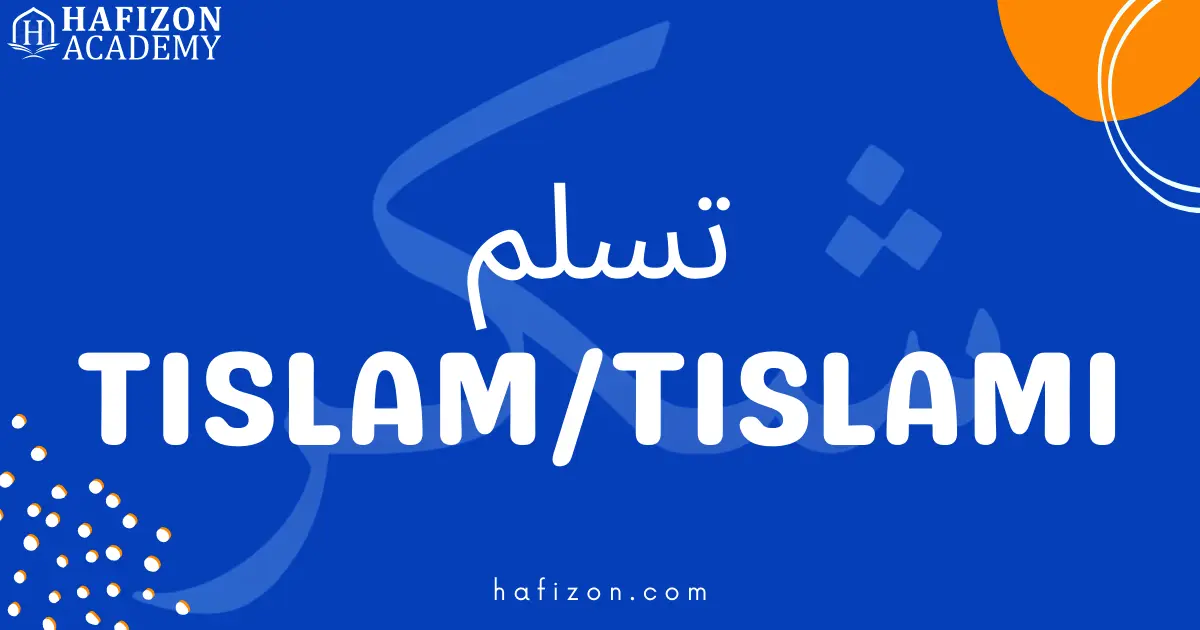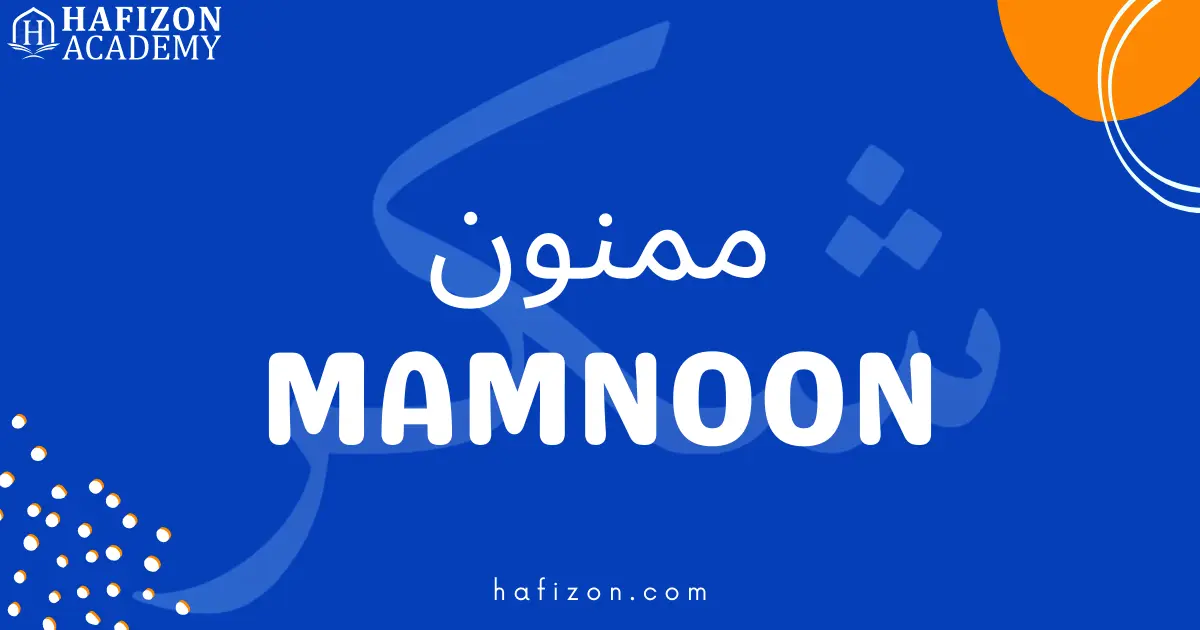

The Holy Quran verses always remind us to be grateful to Allah (SWT). From the very beginning of the Quran, in Surah Al-Fatiha, we ask Allah for guidance while also thanking Him for His countless blessings. In Surah Al-Baqarah, we are reminded to be grateful for our families, our homes, and our wealth. And in Surah Al-‘Ankabut, we are told that those who are grateful will receive more from Allah.
But What Quran says about being grateful? And how can we show our gratitude to Allah?
In this post, we will explore the concept of shukr, or thankfulness, in Islam. We will also look at 12 different ways to say “thank you” in Arabic.


Allah tells us in the Quran: “And [remember] when your Lord proclaimed, ‘If you are grateful, I will surely increase you [in favor]; but if you deny, indeed, My punishment is severe.” (Quran 14:7)
This verse reminds us that we should be grateful for the blessings that we have been given, as it will only lead to more blessings from Allah.
The Quran also tells us: “And give thanks to Me and do not deny Me.” (Quran 31:6)
This verse is a reminder that we should always be thankful to Allah, no matter what situation we find ourselves in.

Abu Huraira reported: The prophet muhammad, peace and blessings be upon him, said, “Whoever does not thank people has not thanked Allah.”
Source: Sunan Abī Dāwūd 4811 – Grade: Sahih (authentic) according to Ahmad Shakire
In other words, thanking people is a form of showing gratitude to Allah This hadith highlights the importance of showing gratitude to others, as it is an act of worship that pleases Allah which leads to a better relationship with Allah.
When we are grateful to others, we are acknowledging the good that they have done for us, and we are also acknowledging Allah’s blessings in our lives.
This is a powerful way to build strong relationships with others, as it shows that we appreciate them and are grateful for their help.
It is also a way to show humility, as we are acknowledging that we cannot do everything on our own and that we need the help of others.
So the next time someone does something good for you, take a moment to thank them and remember that you are also thanking Allah.

SHUKR is an Arabic word that means “to bestow” or “to give” thanks. It is often used to describe the act of thanking Allah for His blessings.
Muslims believe that everything good in this life is a blessing from Allah, and so SHUKR is a way for us to express our gratitude to Him. SHUKR also reminds us to be thankful for the people in our lives who are good to us, and to show them our appreciation.
SHUKR is therefore an important part of our faith; it helps us to remember that everything we have is a gift from God, and we should be grateful for His blessings.
Thanking Someone is a Sign of Good Manners and Is Always Appreciated. There Are a Few Different Ways to Say “thank you” in Arabic, Depending on the Situation.
For a general “thank you,” you can say “shukran” (pronounced “shoo-krahn”). If someone does something nice for you, you can say “Jazakallah” (pronounced “jah-zah-kah-lah”), which means “may Allah reward you.”
If you’re feeling particularly grateful, you can say “Jazakallah khair” (pronounced “jah-zah-kah-lah kahyeer”), which means “may Allah reward
In modern standard arabic, the most common translation for thank you is shukran شكرًا لك, while thank you very much in Arabic means Shoukran jazilan شكرًا جزيلا
thank you Allah in Arabic is translated to Alhamdulillah ( الحمد لله in Arabic)
Thank You in Arabic Can Be Said in Many Different Ways, formal and informal, Depending on The Dialect. here are some Common Phrases

That’s the most common way to say Shukran is derived from the Arabic word shukr which means praise or appreciation… Arabs used to say this word as a polite and formal way to express gratitude for people in formal situations or for people you don’t have a strong relationship or order with you.
The most common response to Shukran is Afwan عفوًا which means pardon or no problem.
Words that Equals Shukran :

a very common Egyptian expression to say thank you, especially told by the elderly when you make them a favor. and its English translation literally means may god increase his gifts for you.
ex: كتّر خيرك على تعبك معانا

Another casual way to say thank you, especially between youth and means may Allah protects you from any harm…تسلم is used in Egypt, and تسلمي (by adding ي) is used to address the women. The equivalent for تسلم in the Gulf countries is يسلموا. In Lebanese, they tend to say تسلم عيوني.
Ex: حبيبي تسلم, Thank you, dear

ممنون is a Lebanese word to say thank you and it means in English I owe to you or I’m indebted to you.. they also say it like ممنونك
Ex: أنا ممنون لك

One of the most used phrases to say thank you in Arabic around the Arab countries means may God bless you, another similar expression is .بارك الله بك (which means god bless others by you)

If you have visited or have friends from the gulf countries, a nice way of saying thank you and i am sure you have heard this expression many times. يعطيك العافية- yuetik aleafia is used to express gratitude and means in English, may god grant you good health. People often respond to this phrase by saying الله يعافيك which has the same meaning.

Another expression widely used in the gulf means you spared no effort. You can reply to this phrase by saying تسلم يا ..اقل من حقك which means thank you, (and say his/her name), that’s less than you deserve which can be an acceptable exaggeration. Also, you can say تستاهل اكثر which delivers the same meaning (you deserve more).
This expression is used, especially for someone who offers you food or invites you to dinner, so you thank him by saying سلمت يداك which means I give thanks to your hands since they (hands) have contributed much in making this meal… Egyptian people use this word often in the present tense. They say it تسلم ايدك.
You can respond to سلمت يداك by saying صحة وعافية على قلبك يا غالي which means may Allah keep you safe and sound, my dear

It is a very Egyptian expression and it includes thanks and apology at the same time. تعبتك معايا means I knew well I tired you but I appreciate your efforts…And it’s often said in a broken, pleading voice
the response to this word might be تعبك راحة which means you This tiredness is nothing, even it’s a comfort! .. of course, another exaggeration but widely used in Egypt.

A very Islamic distinct way to say thank you in Arabic and used widely in the Arab world. Gazakallah khairn means may all reward you with goodness. And your response with the same phrase or shorten it to وجزاك which means you, too. or وجزاكِ by adding kasra at the end of the world if the addressee is female.

It’s a very common expression in Morrocan and Tunisian dialect for thanking someone and it means in English may Allah prolong your life… It’s also used as a pardon in some contexts.
There Are Many Ways to Say Thank You, and Each One Conveys a Different Message. Here Are 27 Phrases to Choose from The Next Time You Want to Express Your Gratitude:
أنا أقدر توجيهاتك / I appreciate your guidance
شكراً جزيلاً – shukraan jzylaan / Thank you very much.
شكراً للمرة المليون – shkraan lilmarat almilyun /Thanks a million .
أقدرك للغاية – uqadiruk lilghaya / I sincerely appreciate ….
خالص تقديري / امتناني / شكري – khalis taqdiri / My sincere appreciation/gratitude/thanks.
شكري وتقديري – shukri wataqdiri / My thanks and appreciation.
أرجو أن تقبل شكري العميق – ‘arju ‘an taqbal shukri alamiq / Please accept my deepest thanks.
شكراً لك على …shkraan laka alaa / Thank you for you…
أقدر لك – ‘uqadir lak / I appreciate you.
أقدر لك الوقت الذي استغرقته – ‘uqadir lak alwaqt aladhi astaghraqath / I appreciate your taking the time.
شكراً لمساعدتك – shkraan limusaadatik/ Thank you for your assistance.
شكراً لك على كل ما تفعله – shkraan lak ealaa kuli ma tafealuh/ Thank you for everything you do.
لم أستطع فعل ذلك بدونك / I couldn’t have done it without you.
أنا مدين لك – ‘ana madin lak / I owe you one.
إنه لطف منك – ‘iinah lutif mink/ It’s so kind of you too.
أنا ممتن جداً لـ – ‘ana mumtanun jdaan / I’m so grateful for…
The Quran and the Prophet Muhammad [PBUH] emphasize the importance of being grateful to people.
Thank you for reading about how to say thank you in different Arabic dialects. The concept of SHUKR is central to Islam, and encompasses thankfulness, appreciation, and praise. Saying “thank you” in Arabic can vary depending on the dialect. There are also many phrases that can be used to express gratitude.
We hope this information will be helpful to you in your travels and interactions with Arabic friends. As always, we encourage you to listen and imitate the way native speakers say thank you in their dialects, as this is the best way to learn.

